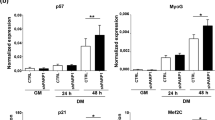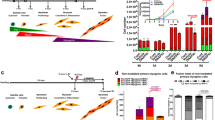Abstract
A MUTANT cell line, Ama102, resistant to the cytotoxic effects of a amanitin, the specific inhibitor of RNA polymerase II (refs 1 and 2), has been selected3 from cultures of Yaffe's4 rat skeletal muscle myoblast cell line, L6, treated with mutagen. Ama102 cells have similar doubling times for growth in the absence or presence of 3 μg ml−1 α amanitin whereas the Ama+ parent does not survive in this concentration of α amanitin. Studies in vitro (ref. 3 and D.S. et al., manuscript in preparation) indicate that Ama102 cells possess an RNA polymerase II which, retains about 30% of its activity in 0.1 μg ml−1 α amanitin, a concentration sufficient to inactivate completely the Ama+ polymerase II. If α amanitin has a similar inhibitory action in vivo and in vitro, the normal growth of Ama102 cells in α amanitin coupled with the partial resistance of its RNA polymerase II activity to α amanitin in vitro seems paradoxical. Does the mutant Ama102 cell grow normally in α amanitin with only 30% of its normal RNA polymerase II active, or can the RNA polymerase II activity increase when the mutant is grown in α amanitin? The experiments reported here indicate that Ama102 cells can compensate for the partial inactivation of RNA polymerase II by α amanitin by increasing the RNA polymerase II activity.
This is a preview of subscription content, access via your institution
Access options
Subscribe to this journal
Receive 51 print issues and online access
$199.00 per year
only $3.90 per issue
Buy this article
- Purchase on Springer Link
- Instant access to full article PDF
Prices may be subject to local taxes which are calculated during checkout
Similar content being viewed by others
References
Kedinger, C., Gniazdowski, M., Mandel, J.-L., Gissinger, F., and Chambon, P., Biochem. biophys. Res. Commun., 38, 165–171 (1970).
Lindell, T. J., Weinberg, F., Morris, P. W., Roeder, R. G., and Rutter, W. J., Science, 170, 447–449 (1970).
Somers, D. G., Ingles, C. J., and Pearson, M. L., Fedn Proc., 33, 1349 (1974).
Yaffe, D., Proc. natn. Acad. Sci. U.S.A., 61, 477–483 (1968).
Weinmann, R., and Roeder, R. G., Proc. natn. Acad. Sci. U.S.A., 71, 1790–1794 (1974).
Goldberger, R. F., Science, 183, 810–816 (1974).
Hayward, R. S., Tittawella, I. P. B., and Scaife, J. G., Nature new Biol., 243, 6–9 (1973).
Kirschbaum, J. B., Proc. natn. Acad. Sci. U.S.A., 70, 2651–2655 (1973).
Roeder, R.G., and Rutter, W. J., Nature, 224, 234–237 (1969).
Lowry, O. H., Rosebrough, N. J., Farr, A. L., and Randall, R. J., J. biol. Chem., 193, 265–275 (1951).
Author information
Authors and Affiliations
Rights and permissions
About this article
Cite this article
SOMERS, D., PEARSON, M. & INGLES, C. Regulation of RNA polymerase II activity in a mutant rat myoblast cell line resistant to α amanitin. Nature 253, 372–374 (1975). https://doi.org/10.1038/253372a0
Received:
Revised:
Issue Date:
DOI: https://doi.org/10.1038/253372a0
This article is cited by
-
Clonal analysis of two mutations in the large subunit of RNA polymerase II of Drosophila
Molecular and General Genetics MGG (1985)
-
Involvement of ribonucleotide reductase in cellular differentiation
Bioscience Reports (1984)
-
Human diploid fibroblast mutants with altered RNA polymerase II
Somatic Cell Genetics (1976)
Comments
By submitting a comment you agree to abide by our Terms and Community Guidelines. If you find something abusive or that does not comply with our terms or guidelines please flag it as inappropriate.



